




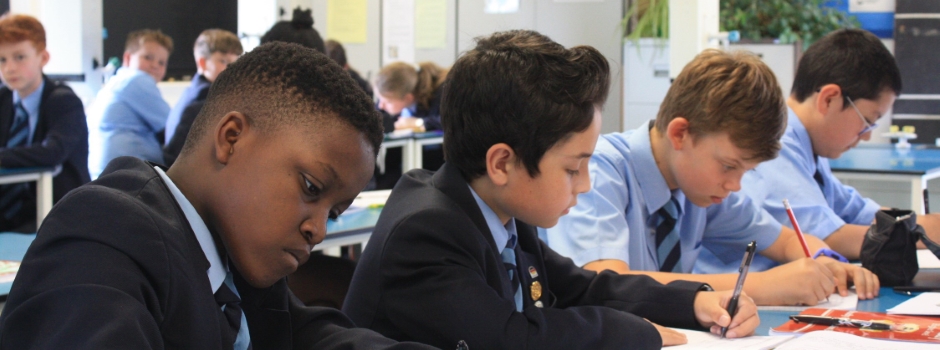
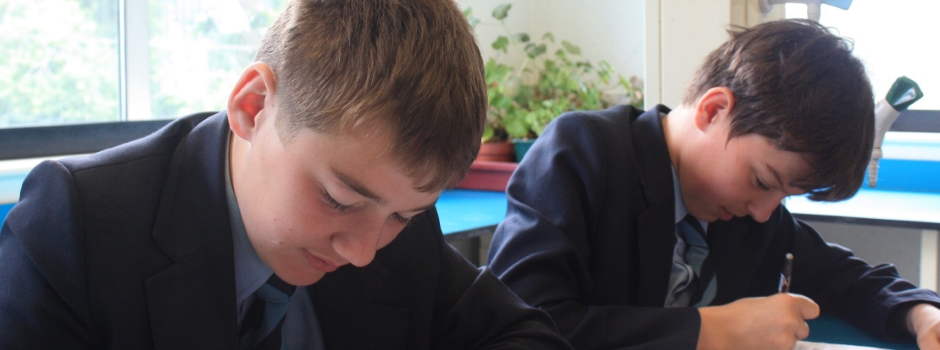







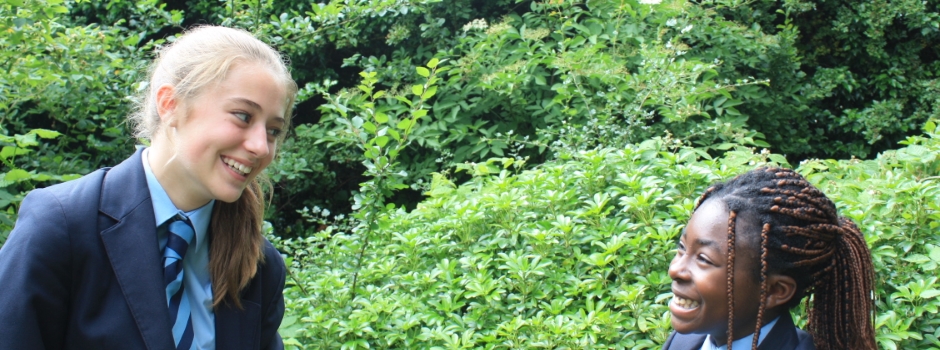

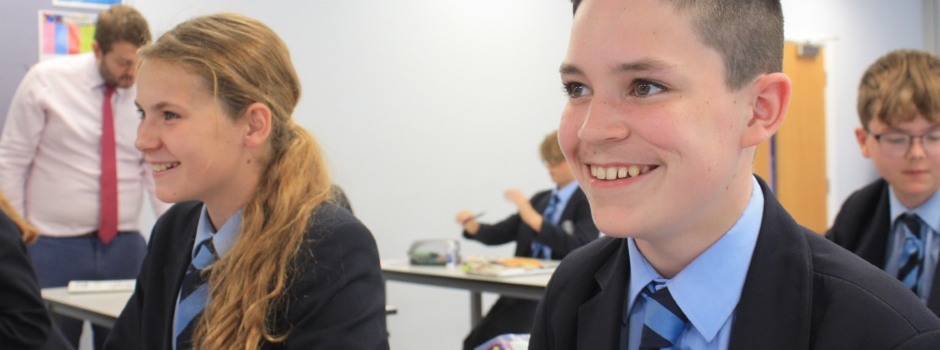






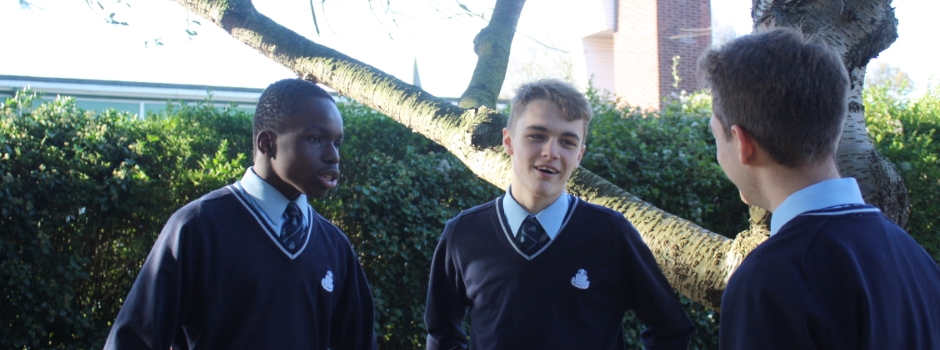
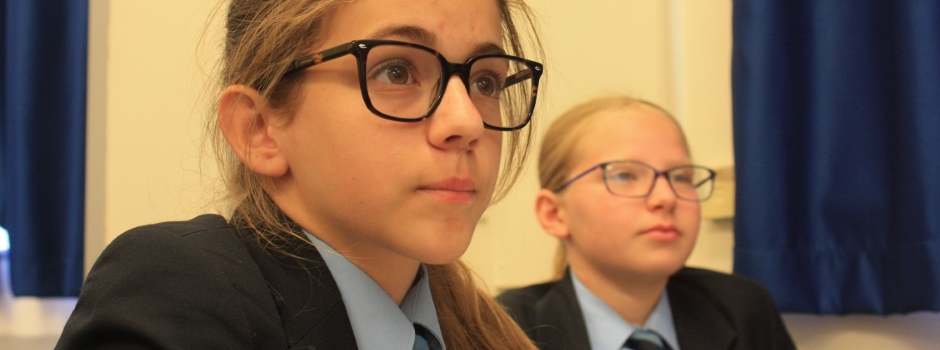









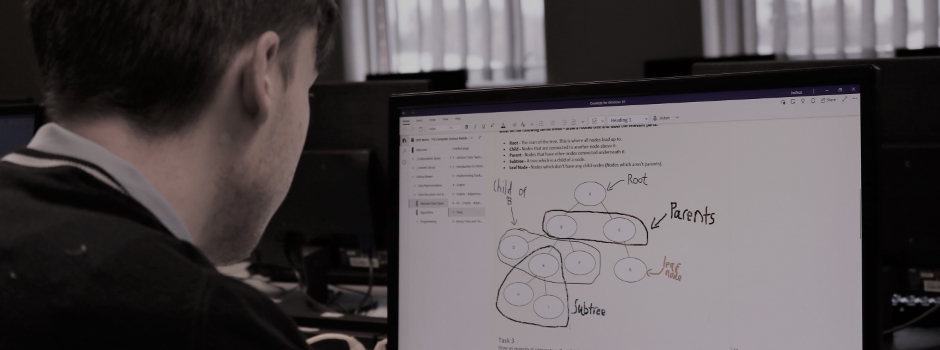





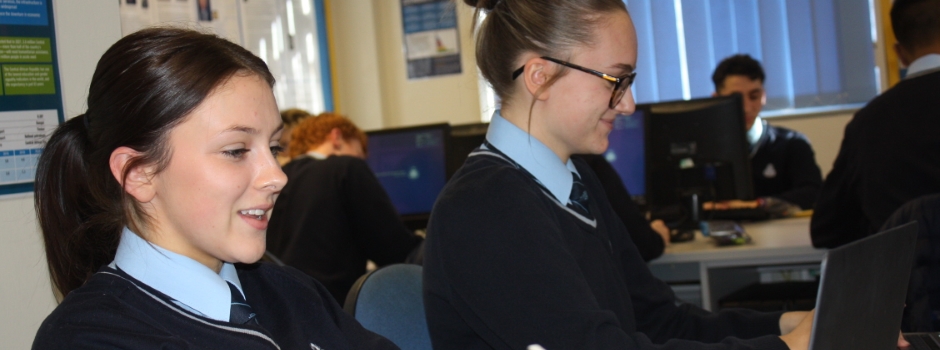

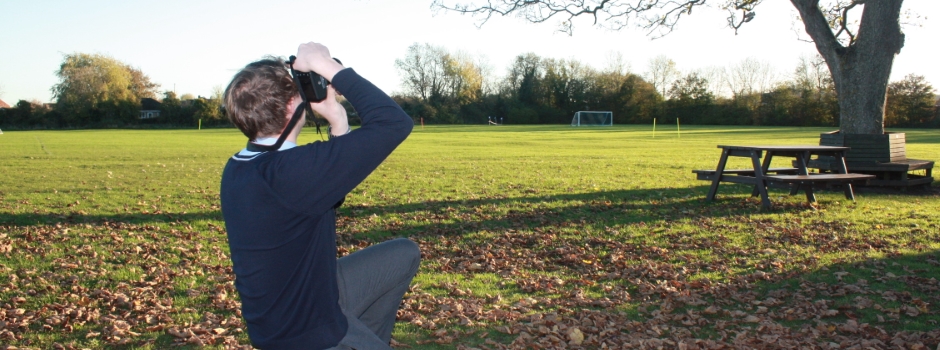








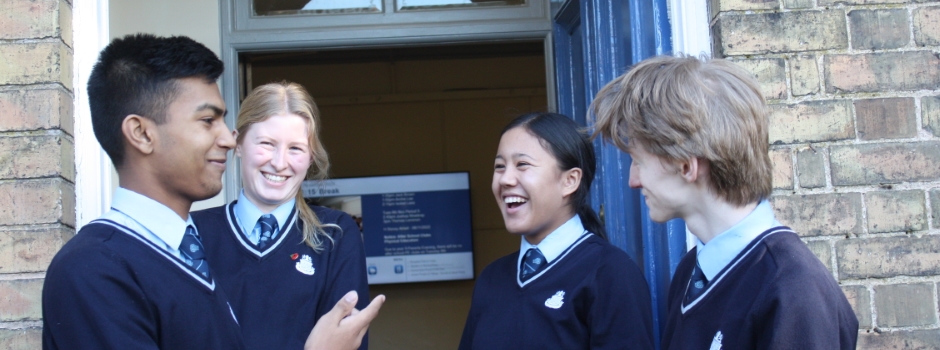
"It's been a whirlwind of wonderful experiences for him. I am so grateful that he’s been at a school that has nurtured and enabled him - thank you."
Year 13 - Curriculum on a Page
Showing the curriculum by year
Year 13
Curriculum Details - 2024/2025 (Current)
| Subject | Term 1 | Term 2 | Term 3 | Term 4 | Term 5 | Term 6 |
| Art | Personal Investigation - Focus 'Recording'. Pupils will work from direct observation and their own photographs to develop work on their chosen theme. Photography skills - photographing objects, different viewpoints, lighting, composition, creating the 'Unexpected'. Personal Study essay. | Personal Investigation - Focus - Research and Investigation. Looking at the work of artists linked to theme. In depth analysis, studies of artists' work, contextual ideas. Personal study - write and complete Personal Study. Final Draft. | Personal Investigation - Focus -Development of ideas. Idea development in the sketchbook and extending beyond the sketchbook. Personal Study completion. Final Exam paper received on 1st Feb. Pupils starting exam preparation work. | Personal Investigation - Focus - Final piece/pieces. Exam work completed by end of Term 4. | Presentation of Personal Investigation work for Moderation. | |
| Biology | Energy and Ecosystems. Nutrient Cycles (Nitrogen and Phosphorus) and the impact of agriculture on ecosystems. Population dynamics. Succession. Survival and response: taxis, kinesis, reflexes and tropisms. Required Practicals 10 & 12. | Survival and response: receptors, nerve impulses, synapses and muscles as effectors. Control of heart rate. Homeostasis: blood glucose and blood water potential. | Inheritance. Population genetics and Hardy-Weinberg. Gene expression and cancer. | Control of gene expression: regulation of transcription and translation, epigenetic control. "Junk" DNA and stem cells. Cloning. | Gene technologies: in-vivo and in-vitro gene cloning using the PCR, genetic modification, diagnosing heritable conditions and treating them with gene therapy. Genome projects and genetic fingerprinting. | Essay preparation, revision and practice exams. |
| Business (Applied) | Unit 4 - Managing and Leading People: investigate the roles of managers and leaders. Investigate the factors affecting the performance of employees within organisation. Unit 5 - Developing a Business Proposal: Develop a business proposal. P3, P4, P5, P6, M3, M4, M5, D2, D3. | Unit 4 - Managing and Leading People: assess the ability of managers to lead and empower employees. Assess the use of leadership and empowerment to implement organisation change. Unit 5 - Developing a Business Proposal: Present a business proposal to funding providers. P7, P8, M6, M7, D4. D6. | Unit 5 - Developing a Business Proposal: Review a business proposal. P9, P10, M8, M9, D6. Unit 7 - Managing an event: Investigate events delivered by small businesses. P1, P2, M1, M2, D1. Careers - potential career progression. | Unit 7 - Managing an event: Plan an event. P3, P4, P5, P6, M3, M4, M5, D2, D3. Careers - identifying the roles and responsibilities of event planners. | Unit 7 - Managing an event: Deliver the event. Review the event. P7, P8, M6, M7, D4. D5. P9, P10, M8, M9, D6. Careers - linking the even to their potential future business ideas. | Examinations. |
| Business Studies | Continuing with year 2 content. Calculating and analysing financial ratios. Analysing the external environment of a business- political, legal, economic, social and technological change. | Unit 7:Analysing the competitive environment and carrying out investment appraisal. Unit 8: Analysing strategic direction including Ansoff's matrix and strategic positioning using Porter's and Bowman's models. | Unit 9: Analysing strategic methods, growth, retrenchment, innovation, internationalisation and digital technology. Unit 10: Analysing how to manage change when pursuing a strategy, including overcoming resistance to change. | Unit 10: Understanding how to manage organisational culture and how to implement a strategy. Analysing problems when carrying out a strategy and the reasons why strategies fail. | Revision | N/A |
| Chemistry | Kinetics (including Arrhenius and Rate equation required practicals), gaseous equlibriua (Kp), acid base equilibria (Ka, Kw, buffer solutions, titration curves and required practical). | Optical isomerism, aldehydes, ketones, carboxylic acids and their derivatives. Electrode potentials and electrochemical cells (including required practical). | Transition metal chemistry (including identification of aqueous ions required practical), properties of Period 3 elements and their oxides. Aromatic chemistry (including preparation and purification of an organic solid required practical) | Properties and reactions of amines, Amino acids (including required practical - TLC), proteins, DNA, Polymers (synthetic and natural). | Synthesis to include a complete review of organic reactions and mechanisms, analysis (nmr, IR, chromatography) | Independent preparation for and completion of external exams. |
| Computer Science | Communications and Networks Fundamentals of Computer Systems. | Programming Project Fundamentals of Computer Systems. | Programming Project Consequences of uses of Computing Computer Organisation and Architecture. | Revision. | Revision. | N/A |
| DT: Product Design | Paper 2 - Continue to revise paper 1 L43-44-Design-methods L45-Design-history SECTION C | Paper 2 - Continue to revise paper 1 L46-47-Design-movements L48-Key-designers L49-51-Major-developments-in-technology L52-53-Design-processes | Paper 2 - Continue to revise paper 1 L54-55-Critical-analysis L54-55-Critical-analysis L56-selecting-tools-and-processes Mock | Paper 2 - Continue to revise paper 1 L57-Accuracy-in-design L58-59-Responsible-design L60-61-Design-for-manufacture L62-International-standards | Revision | Revision |
| Economics | In Microeconomics we cover Labour Market Economics and Business Growth and Objectives. In Macroeconomics we examine Financial Economics and International Economics. | In Microeconomics we examine Revenues, Costs & Profits as well as the different Market Structures that can exist. In Macroeconomics we examine Poverty and Inequality as well as Emerging and Developing Economies. | In Microeconomics we complete the evaluation of different Market Structures and how the Government might intervene to influence them. In Macroeconomics we complete our examination of Emerging and Developing Economies and look at how different economies attempt to manage their macroeconomy. | In microeconomics we complete Government Intervention and then start the Revision process. In macroeconomics we complete The Role of the State in the Macro economy. | Revision and Exam Practice: Paper 1 = Micro Paper 2 = Macro Paper 3 = Combination of Micro and Macro. | Public examinations. |
| English Language | Completion of the NEA | Creative and critical writing with a focus on writing for a wide range of different purposes and audiences (Component 3) Language Change in written texts (Component 2) | Component 3 - Creative and critical writing including how to write a commentary on your own writing Language Change in Written Texts (Component 2) | Language Issues - Language and Situation and Language and Power Revision Language Change revision | Language Issues: Child Language Acquisition revision Language Change Revision | N/A |
| English Literature | Completion of NEA | Paper 1 - Shakespeare Paper 2 - Unseen Prose | Paper 1 - Shakespeare Paper 2 - Revision of Y12 texts and deepening understanding of modern texts; unseen prose | Paper 1 - Revision of Paper 1 texts and deepening understanding of the presentation of love in texts through time Paper 2 revision | Paper 1 & 2 revision | |
| French | Consider benefits of an ethnically diverse society, need for tolerance and respect of diversity and how to promote diversity. Examine which groups are socially marginalised, measures to help and consider contrasting attitudes to the marginalised. Grammar: revision of main tenses. | Study of a book, written by a French speaking author. Discuss theme, character, social and cultural context in book. Develop essay writing skills and style. Research IRP and develop presentation/discussion (content and skills) Development of complex language and essay structure. | Examine different attitudes to crime, prisons - merits and problems, alternative forms of punishment. Discuss the right to vote, youth political engagement and the future of politics Grammar: recognising past historic, si clauses, infinitive constructions, passive voice, subjunctive | Understand the importance of trade unions, methods of protesting, attitudes to strikes, and other tensions Political issues concerning immigration in francophone countries, immigrants and political parties viewpoints on immigration Grammar: object pronouns, relative pronouns, tense revision | Students will develop their exam techniques, vocab knowledge and speaking/writing skills as well as translation, listening and reading skills. Refine any exam skills/application of grammar as indicated by mock performances and past paper performances | External exams |
| Further Mathematics | Further Statistics 1 Unit 3 - Geometric & negative binomial distributions Unit 4 - Geometric dist. hypothesis testing (Y13 content) Unit 6 - Geometric dist. chi-squared tests (Y13 content) Unit 7 - Probability generating functions Unit 5 - Central limit theorem Assessments - Unit assessments | Core Pure 2 Unit 1 - Complex number Unit 2 - Series Unit 5 - Polar Coordinates Assessments - Unit assessments through the term | January exams Core Pure 2 Unit 3 - Methods on calculus Unit 4 - Volumes of revolution Unit 6 - Hyperbolic functions Assessments - Unit assessments through the term | Y13 Mock Exams Core Pure 2 Unit 6 - Differential equations Unit 7 - Modelling with differential equations Revision Assessments - Unit assessments through the term | Revision, study leave and exams. | Study leave and exams; Core Pure Paper 1 and Core Pure Paper 2 each of 1 hour and 30 minutes duration. Two option papers both of 1 hour and 30 minutes duration; Paper 3 is Option 1 FS 1. Paper 4 is Option 2; DM 1. |
| Geography | Physical: Hot Deserts Human: Global Systems and Global Governance Non-Examined Assessment: Results, Conclusion and Bibliography Careers: Hot Desert Conservation | Physical: Hot Deserts Human: Global Systems and Global Governance Non-Examined Assessment: Completed Careers: Jobs in Antarctica | Physical: Hot Deserts Human: Global Systems and Global Governance | Quantitative and qualitative skills Revision | ||
| German | Reasons for migration. Evaluation of (dis)advantages for migrants and country of destination. Examination of issues affecting migration policies. Weak masculine nouns Complex adjectival phrases Adjectival endings | Impact of racism on victims and available support Discuss origins of racism. Discuss how to resist/fight racism Relative and interrogative pronouns Revision of present and future tenses Subjunctive in indirect speech (past) | Study of a book, written by a German speaking author. Discuss theme, character, social and cultural context in film. Develop essay writing skills and style. Research IRP and develop presentation/discussion (content and skills) Development of complex language and essay structure. | Discuss in which way young people engage in politics Priorities for youth politics Priorities of young people and the role of pressure groups Recap On Reunification Revision passive Using modal particles Revision word order, including changing emphasis Exam practice | The speaking exam in early May. Development of exam techniques, vocab knowledge and speaking/writing skills as well as translation, listening and reading skills and grammar, through past papers. | External Exams. |
| History | Coursework - 1980-1991, the End of the Cold War. Teaching component giving an overview of issues, interpretations and events. Stuarts - Restoration period then religion (Church of England and dissenters) | Coursework - 1980-1991, the End of the Cold War, students carry out individual research and write their first draft. Stuarts - Religion (fear of Catholicism) then Society (population, social structure and radical groups) | Coursework - 1980-1991, the End of the Cold War, students respond to first draft feedback and complete final draft and associated documentation. Stuarts - Economy (agriculture, cloth trade, banking and insurance, empire) | British Experience of Warfare revision, with a focus on core exam paper skills and salient content. Stuarts - Glorious Revolution interpretations section | British Experience of Warfare revision continues, consolidating core skills and their application. Stuarts & Russia; revise through the two units in this order. | Study Leave |
| Mathematics | Pure Maths Functions and graphs, Sequences and series, Binomial expansions part 2 and trigonometric functions. Assessments - Unit assessments through the term | Pure Maths Trigonometry continued, introducing secant, cosecant and cotangent with modelling, differentiation, parametric equations, numerical methods, 3D vectors. Assessments - Unit assessments through the term | Pure and Applied Maths Integration part 1. Review of Y12 & Y13 topics so far as preparation for Y13 January mock exams. Applied Maths Statistics - correlation, regression, hypothesis testing, conditional probability and the normal distribution part 1. Assessments - Unit assessments through the term | Pure Maths Integration part 2. Applied Maths Statistics - the normal distribution part 2. Mechanics - moments, forces and friction and projectiles. Assessments - Unit assessments through the term | Applied Maths Further kinematics and application of forces. Pure and Applied Maths Revision and exam practice for final exams. | External exams - Paper 1 Pure (2 hours), Paper 2 Pure Maths (2 hours) and Paper 3 Mechanics and Statistics (2 hours). |
| Philosophy and Ethics | Christianity: Jesus Augustine's teaching on human nature Death and the afterlife Knowledge of God's existence | Christianity: Christian moral principles Christian moral action Religious pluralism and theology Religious pluralism and society | Christianity: Gender and society Gender and theology | Christianity: The challenge of secularism Liberation theology and Marx | Learning Activities to revisit all topics | A Level Examination |
| Photography | Personal Investigation - Focus 'Recording'. Pupils will work from their own photographs to develop work on their chosen theme. Skills include - photographing objects, different viewpoints, lighting, composition, ISO, Aperture and Shutter Speed. Personal Study essay started. | Personal Investigation - Focus - Research and Investigation. Looking at the work of artists linked to theme. In depth analysis, studies of artists' work, contextual ideas. Personal study - write and complete Personal Study. Final Draft. | Personal Investigation - Focus -Development of ideas. Idea development in the sketchbook and extending beyond the sketchbook. Personal Study completion. Final Exam paper received on 1st Feb. Pupils starting exam preparation work. | Personal Investigation - Focus - Final piece/pieces. Exam work completed by end of Term 4. | Presentation of Personal Investigation work for Moderation. | |
| Physical Education | Exercise Physiology - Training methods, injury prevention and recovery methods, diet manipulation and supplements Sports Psychology - group dynamics, attributions, self-efficacy and confidence | Sport and Society and Technology - concepts of physical activity, development of elite performers, ethics in sport Biomechanics - biomechanical principles, lever systems, linear motion | Sport and Society and Technology - violence in sport, PEDs, sport and the law, impact of commercialisation and technology Biomechanics - Angular motion, projectile motion, fluid mechanics | Revision | Revision and exam preparation Practical Moderation. | Revision |
| Physical Education (non exam) | The emphasis is on using physical activity to improve mental and physical wellbeing. Options: Badminton, Basketball, Dodgeball, Fitness, Football, Netball, Table Tennis & Walking. | The emphasis is on using physical activity to improve mental and physical wellbeing. Options: Badminton, Basketball, Dodgeball, Fitness, Football, Netball, Table Tennis & Walking. House football and netball also take place in this term | The emphasis is on using physical activity to improve mental and physical wellbeing. Options: Badminton, Basketball, Dodgeball, Fitness, Football, Netball, Table Tennis & Walking. | The emphasis is on using physical activity to improve mental and physical wellbeing. Options: Badminton, Basketball, Dodgeball, Fitness, Football, Netball, Table Tennis & Walking. | The emphasis is on using physical activity to improve mental and physical wellbeing. Options: Athletics, Cricket, Football, Golf, & Rounders | |
| Physics | Temperature, solids, liquids and gases, internal energy, specific heat capacity, specific latent heat, kinetic theory of gases, gas laws, root mean square speed, Boltzmann constant, Required practicals 8 and 11. | Angular velocity and the radian, centripetal acceleration, exploring centripetal forces, oscillations and simple harmonic motion, analysing simple harmonic motion, simple harmonic motion and energy, damping and driving, resonance, Required practical 10. | Gravitational fields, Newton's law of gravitation, Kepler's laws, satellites, gravitational potential, objects in the universe, star life-cycle, Hertzsprung-Russell diagram, stellar luminosity, astronomical distances, Doppler effect, Hubble's law, Big Bang Theory | Capacitors in circuits, energy stored by capacitors, charging and discharging capacitors, electric fields, Coulomb's law, uniform electric fields, charged particles in electric and magnetic fields, Faraday's law, Lenz's law, transformers, required practical 9. | Rutherford scattering, antiparticles, hadrons and leptons, quarks, nuclear decay, half-life, modelling radioactive decay, carbon dating, binding energy, nuclear fission and fusion, X-rays, CAT scans, gamma camera, PET scans, ultrasound, required practical 7. | Exam preparation. |
| PSHE | Transition to Y13. Post Sixth Form: Completion of UCAS applications and transition to uni- to include a look at student accommodation. (careers) | Finances: Student finance preparation. (careers) Understanding how to budget finances. Wellbeing: Mental health and addictive behaviour | Wellbeing: Alcohol and drugs Healthy Relationships- sexual relationships, consent and harassment. | Wellbeing: Personal health and staying safe as a a young adult both now and post Sixth Form. | Preparation for exams- review of study skills, creation of exam timetables and understanding how to manage exam stress. | N/A |
| Psychology | Relationships - the evolutionary explanation for partner preference, factors affecting attraction in romantic relationships, theories of romantic relationships, virtual relationships in social media and parasocial relationships. Studies - Buss, Walster, Duck, Joinson, McKenna | Schizophrenia - classification and biological/psychological explanations for Schizophrenia, drug therapy (typical and atypical antipsychotics), cognitive behaviour therapy and family therapy. Interlinking it with the interactionist approach Studies - Diathesis-Stress Model, Chadwick | Forensic Psychology - offender profiling, biological/psychological explanations of offending behaviour, dealing with offending behaviour Biopsychology (Year 13) - function of the brain and hemispheric lateralisation, ways of studying the brain (fMRI, EEGs, ERPs), biological rhythms | Issues and debates - gender and cultural bias, free will and determinism, nature-nurture debate, holism and reductionism, idiographic and nomothetic approaches, ethical implications of research | Revision term - going over Yr12 and 13 topics. Focusing on exam techniques for the longer mark questions. | Study leave and exam period |
| Sociology | Beliefs in society: ideology, science and religion. Social change and religion. Different types of religious organisations. Secularistion debate. | Beliefs continued: the relationship between different social groups and religion. Begin Crime and Deviance: theories-crime, deviance and social order. | The distribution of crime and deviance by ethnicity, social class and gender. Crime control, surveillance, prevention and punishment, victims and the role of the criminal justice system. | Globalisation and crime in contemporary society; the media and crime, green crime and human rights and state crime. Begin revision. | Revision. | External exams |
| Spanish |